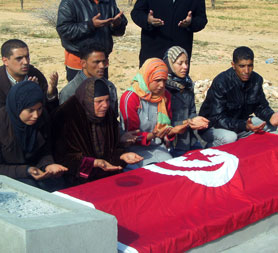Sidi Bouzid: roots of the Tunisia revolution
As protests in Tunisia continue forcing several Ministers to resign, Jonathan Rugman visits the town of Sidi Bouzid, where a young man burned himself to death and inspired a national revolt.
A four-hour drive south of Tunis, across a vast and arid plain, and you reach the birthplace of last week’s revolution.
Sidi Bouzid, a town of 40,000, is barely mentioned in guidebooks, but its place in Tunisian history now seems certain.
The town’s main square is full of pro-democracy protesters, revelling in their newfound freedom after President Zine al-Abedine Ben Ali fled to exile during violent riots last week.
The protesters chant in the shadow a photo of Mohammed Bouazizi – a poor vegetable seller whose decision to burn himself to death inspired a nation.
For years the vegetable seller worked at his cart next to this one on Sidi Bouzid’s main streets. He was 23 and had left school early because his widowed mother couldn’t afford to keep him there.
On 17 December Mr Bouazizi’s vegetable cart was confiscated by the town council which said he didn’t have permission to trade. When he tried to get the cart back a woman from the council slapped him in the face.
“I thank God we were sent this caring boy who opened the gates for all the people of Tunisia – and for all the Arab world.” Manoubia Bouazizi
It was the final act that sent the vegetable seller over the edge.
He went to the governor’s office and set himself alight. He later died in hospital.
Immolation
The spot where he doused himself with petrol is still marked with red paint. The local people call it the “place of martyrdom”.
Moments after Mr Bouazizi’s death the first protests began. Tunisians gathered around his abandoned vegetable cart and scaled the Governor’s gates. The unrest then spread across the country and one month later it unseated the President.

Mr Bouazizi’s mother told Channel 4 News she never could have believed her son would kill himself.
“I couldn’t have imagined it,” Manoubia Bouazizi said.
“Mohammed was not sick or insane. But the clerks of the municipality always made trouble for him, they always took away his weighing scales. Because of the oppression and the pressure he set himself alight.”
She added that she could never have imagined his act would lead to the ousting of the President.
“I never could have believed it,” she said.
“I thank God we were sent this caring boy who opened the gates for all the people of Tunisia – and for all the Arab world.”
Outside Sidi Bouzid lies the Bouazizi ancestral home – although nobody from the family lives in the countryside now because work here is scarce. Mr Bouazizi is buried amid the olive and almond groves.
“No wonder there was revolution here when you see how we live”, a relative who had helped dig his grave told Channel 4 News.
“All Tunisian should come to this spot to pay their respects”.